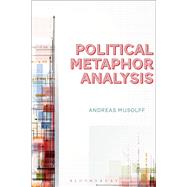Political Metaphor Analysis
, by Musolff, Andreas- ISBN: 9781441160669 | 1441160663
- Cover: Paperback
- Copyright: 8/25/2016
Political Metaphor Analysis provides an innovative approach to the study of metaphor in political discourse. It presents empirical analyses of metaphor use based on a large corpus of political metaphors and links these analyses to theoretical positions and assessing their limitations and perspectives for further exploration. In particular the 'classic' conceptual metaphor analysis, as pioneered by Lakoff and Johnson (1980) and expanded and amended over the past 35 years, is critically examined with regard to empirical aspects such as variation, historicity, pragmatic exploitation, comprehension and interpretation of metaphors.
Political metaphors and related figurative discourse tools such as metonymies are characterised by their variability and contentiousness. Using them, discourse participants try to gain competitive advantage over others by offering their audiences new meaning nuances, challenging each other and announcing political initiatives. It is here that metaphor as a means to change meanings – and thus, to change social and political reality – comes into its own.
Proposed as a central new analytical category, the notion of “metaphor scenarios” is tested against various sub-sets of data. It allows us to link hypothesised conceptual metaphors to narrative, argumentative and evaluative patterns in actual discourse and understanding, so that their cognitive significance can be more reliably gauged and theoretically modelled.







